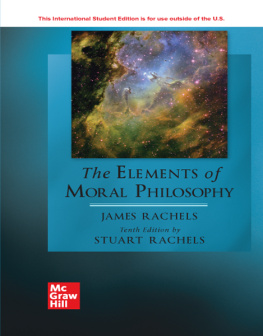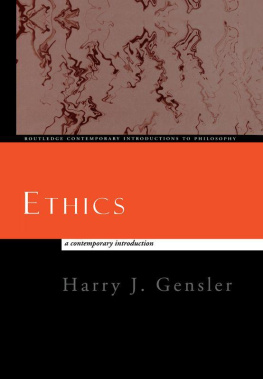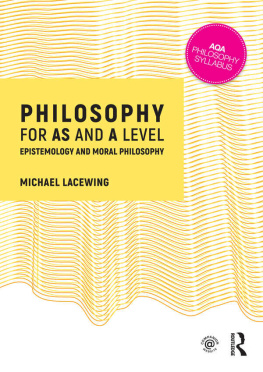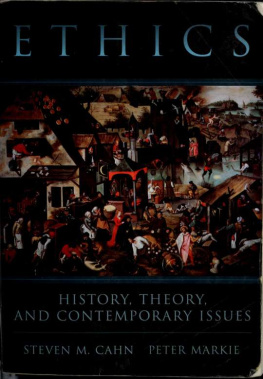
page i
T he Elements of
Moral Philosophy
TENTH EDITION
J ames R achels
Editions 510 by
S tuart R achels

page ii

THE ELEMENTS OF MORAL PHILOSOPHY
Published by McGraw Hill LLC, 1325 Avenue of the Americas, New York, NY 10019. Copyright 2023 by McGraw Hill LLC. All rights reserved. Printed in the United States of America. No part of this publication may be reproduced or distributed in any form or by any means, or stored in a database or retrieval system, without the prior written consent of McGraw Hill LLC, including, but not limited to, in any network or other electronic storage or transmission, or broadcast for distance learning.
Some ancillaries, including electronic and print components, may not be available to customers outside the United States.
This book is printed on acid-free paper.
1 2 3 4 5 6 7 8 9 LCR 27 26 25 24 23 22
ISBN 978-1-265-23718-9
MHID 1-265-23718-2
Cover Image: T.A.Rector (NRAO/AUI/NSF and NOAO/AURA/NSF) and B.A.Wolpa (NOAO/AURA/NSF)
All credits appearing on page or at the end of the book are considered to be an extension of the copyright page.
The Internet addresses listed in the text were accurate at the time of publication. The inclusion of a website does not indicate an endorsement by the authors or McGraw Hill LLC, and McGraw Hill LLC does not guarantee the accuracy of the information presented at these sites.
mheducation.com/highered
page iii
A bout the Authors
J ames R achels (19412003) wrote The End of Life: Euthanasia and Morality (1986), Created from Animals: The Moral Implications of Darwinism (1990), Can Ethics Provide Answers? And Other Essays in Moral Philosophy (1997), Problems from Philosophy (first edition, 2005), and The Legacy of Socrates: Essays in Moral Philosophy (2007). His website is www.jamesrachels.org.
S tuart R achels is Associate Professor of Philosophy at the University of Alabama. He has revised several of James Rachels books, including Problems from Philosophy as well as the companion anthology to this book, The Right Thing to Do . Stuart won the U.S. Chess Championship in 1989, at the age of 20, and wrote The Best I Saw in Chess: Games, Stories and Instruction from an Alabama Prodigy Who Became U.S. Champion (2020).
page iv
C ontents
page v
page vi
page vii

page viii
P reface
Socrates, one of the first and best moral philosophers, said that morality is about no small matter, but how we ought to live. This book is an introduction to moral philosophy, conceived in that broad sense.
The field of ethics is immense. In this book, I do not try to canvass every topic in the field, nor do I cover any topic comprehensively. Instead, I try to discuss the ideas that a newcomer to the subject should encounter first.
The chapters in this book may be read independently of one another; they are, in effect, separate essays on separate topics. Thus, someone who is interested in Ethical Egoism could go straight to Chapter 5 and find a self-contained introduction to that theory. When read in order, however, the chapters tell a more or less continuous story. The first chapter presents a minimum conception of what morality is; the middle chapters cover the most important ethical theories; and the last chapter presents my own view of what a satisfactory moral theory would be like.
However, the point of this book is not to provide a neat, unified account of the truth about ethics. That would be a poor way to introduce the subject. Philosophy is not like physics. In physics, there is a large body of accepted truth that beginners must master. Of course, there are unresolved controversies in physics, but these take place against a backdrop of broad agreement. In philosophy, by contrast, everything is controversialor almost everything. Some of the fundamental issues are still up for grabs. While newcomers to philosophy may ask themselves whether a moral theory such as Utilitarianism seems correct, students of physics are rarely encouraged to make up their own minds about the laws of thermodynamics. A good introduction to ethics will not try to hide that somewhat embarrassing fact.
page ix
In these pages, you will find a survey of contending ideas, theories, and arguments. My own views, no doubt, color the presentation. I find some of these proposals more appealing than others, and a philosopher who made different assessments would write a different book. But I try to present the contending ideas fairly, and when I pass judgment on an argument or theory, I try to explain why. Philosophy, like morality itself, is first and last an exercise in reason; we should embrace the ideas, positions, and theories that the best arguments support.
page x
A bout the Tenth Edition
This edition contains no new chapters or sections, but I have sharpened the writing and updated many of the discussions. Here and there, Ive made what I hope are small improvements to about 715 sentences. Readers familiar with the ninth edition might not notice these changes, but I hope that the text reads smoothly.
Here are some of the minor changes:
- In section 1.2, instead of saying that mere biological life has no value, we now say (more weakly) that mere biological life has no value for the individual in this case, for Baby Theresa. This weaker claim is whats relevant to the Benefits Argument. We neednt take a stand on whether biological life might have a value aside from its value to the individual.
- Section 3.3 is now called The Rejection of Value (instead of The Denial of Value).
- In section 3.5, we no longer discuss the firing of employees for being gay. That discussion was mooted by the U.S. Supreme Courts ruling in Bostock v. Clayton County (2020) that firing someone for being LGBTQ is unconstitutional.
- In section 4.3, we now say that the Theory of Natural Law moves too easily from is to ought, instead of saying that it confuses is and ought.
- In section 6.2, we now explain the origin of the term free rider.
- In section 8.3, regarding the right to privacy, we now mention revenge porn as well as the true case of a man who owned a motel in Colorado and spied on his guests for almost 30 years.
- In section 10.2, we now mention victim impact statements in our discussion of the gratification of victims as a justification of punishment.
- In section 10.3, the Kantian basis of punishment is now given in terms of wrongdoers behaving badly , instead of in terms of criminals committing crimes . The crime formulation needlessly assumes that the criminal laws are just.
- In section 12.2, I replaced conscientiousness with pleasantness in the list of virtues, mostly because conscientiousness overlaps with diligence, which is also on the list.
page xi
I am especially indebted to my wife, Professor Heather Elliott, and to my mother, Carol Rachels, for their help in preparing this edition. This book is a mom-and-pop operation.
My father, James Rachels, wrote the first four editions of The Elements of Moral Philosophy . It is still his book.
Stuart Rachels
page xii

page xiii
 Next page
Next page















